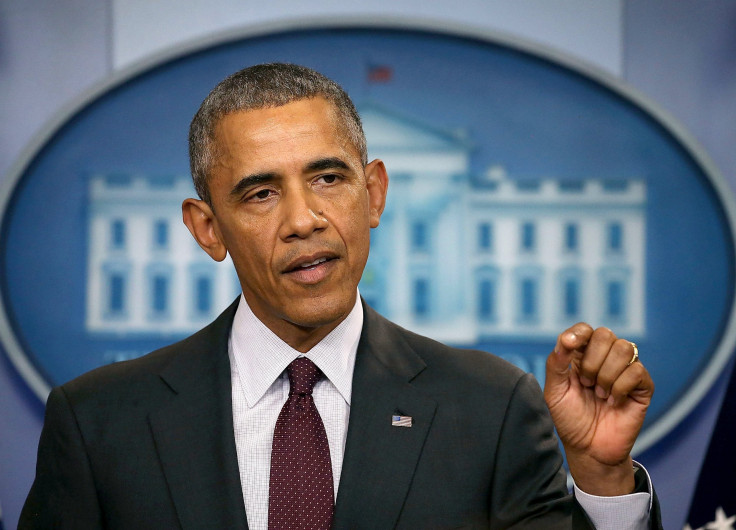From Obamacare To Wages, Here Are President Obama’s Economic Highs And Lows In Five Charts

U.S. President Barack Obama gave a lengthy interview to the New York Times Magazine that was published in a piece Thursday on the accomplishments and shortcomings of his 7 1/2 years in office. Although generally upbeat, he expressed frustration over the way signature policies such as the 2009 economic stimulus and the Affordable Care Act were received.
While the unemployment rate has been cut in half and the once-moribund automotive and banking industries have been saved from the brink of oblivion during his tenure, many Americans remain unsatisfied with the economy, Obama said, a fact that has empowered the unorthodox campaigns of presidential candidates Donald Trump and Bernie Sanders.
“How people feel about the economy,” Obama told journalist Andrew Ross Sorkin, is based on “what they hear.” The message from many Republicans — and some Democrats — hasn’t been rosy.
In contrast, the interview presented Obama with the opportunity to lay out what he believed were the main economic triumphs of his presidency, as well as some of his regrets. Below are five of his key points, charted.
Wavering Wages
It’s true gross domestic product growth has been respectable in the years after the recession, while the headline unemployment rate has fallen below levels many economists once saw as a natural lower bound. Yet, as the current crop of presidential hopefuls are keen to point out, wages remain depressed for many Americans.
Obama conceded the point. “We could have brought down the unemployment rate lower, faster,” he said. “We could have been lifting wages even faster than we did. And those things keep me up at night sometimes.”
Indeed, for the lowest-earning 60 percent of the population, real hourly wages either froze or fell between 2007 and 2015, although the past year has seen substantial gains. Still, overall wage growth remains well below the 20-year average of 3 percent.
A Growing Government?
Republicans have assailed Obama as a typical big-government Democrat, bent on expanding Washington. Yet the pace of government spending under Obama has not been remarkable for its growth, but for its relative restraint.
Unlike virtually all previous economic recoveries, the post-recession period saw the number of government employees contract rather than expand. Due in large part to budget-conscious state and municipal cutbacks — as well as the Republican-driven federal sequestration of 2013 — government employment has dipped as the rest of the job market has surged. Obama blames the trend for holding back economic growth during his presidency.
“This is the first recovery where you actually saw the government workforce decline, and that created this massive fiscal drag throughout the recovery,” Obama said.
Stunted Stimulus
Obama expressed dismay that he spent a huge chunk of his political capital on the Affordable Care Act, aka Obamacare, dooming chances that congressional Republicans would allow another stimulus after 2009. Economists such as Federal Reserve Chair Janet Yellen have cited the lack of government stimulus spending after 2009 for economic growth that has lagged behind its potential.
“Our failure in 2012, 2013, 2014, to initiate a massive infrastructure project — it was the perfect time to do it: low interest rates, construction industry is still on its heels, massive need — the fact that we failed to do that, for example, cost us time,” Obama told the New York Times. “It meant that there were folks who we could have helped and put back to work and entire communities that could have prospered that ended up taking a lot longer to recovery.”
Declining Deficits
As a recent Time magazine cover alarmingly suggested, some Americans are concerned with the size of the national debt, which has grown to almost $14 trillion. But that towering figure obscures the fact that federal government deficit, the annual shortfall between its expenditures and tax revenue, has fallen considerably.
The 2015 federal budget deficit of $439 billion compares unfavorably with the surpluses of the later years of Bill Clinton’s administration. But, as a percentage of GDP, it is lower than any budget under Ronald Reagan.
“If you ask the average person on the streets — ‘Have deficits gone down or up under Obama?’ — probably 70 percent would say they’ve gone up,” Obama said.
Obamacare
The Affordable Care Act constitutes Obama’s most-contested policy, having faced more than 60 Republican votes to either amend or repeal it. Although opinion polls show Americans are split — and generally confused — about the merits of the law, Obama remains proud of it.
But Obamacare hasn’t been able to arrest the growth in health costs and insurance premiums, which have moderated but continue to grow faster than most incomes. As Obama confessed, many Americans can’t grasp the law’s merits when prices are still climbing, even if the rate of growth is not as fast as during previous presidencies.
“If your healthcare premiums go up by 6 percent, you’re still irritated, even though the trend lines have been those premiums are going up 15 percent,” Obama said.
That latter number may be slightly exaggerated, however: Kaiser Family Foundation data show average family premiums increasing at an average of 9 percent from 2000 to 2008.
© Copyright IBTimes 2024. All rights reserved.












